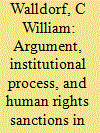|
|
|
Sort Order |
|
|
|
Items / Page
|
|
|
|
|
|
|
| Srl | Item |
| 1 |
ID:
177596


|
|
|
|
|
| Summary/Abstract |
Most theories in the social sciences have intimations of both structure and agency, but in the English School (ES) corpus these appear in a particular way. While the ES is often considered a “structural theory”, in fact, the corpus is largely agentic in orientation. That is, the dynamic elements in ES accounts of international life are either collective or individual agents who hold institutional positions. They are states, state leaders, non-governmental organizations (NGOs), development officers, agency bureaucrats, and so on. Moreover, the agents are, themselves, constantly involved in creating, elaborating, reaffirming, or altering the institutional environments of their action. They are searching out institutional possibilities that will aid their specific objectives, in the process reaffirming them, while also creating or altering the structures within which they act. This points to the significance of structuring processes—successive actions that create stabilizing effects and whose effects have consequences for what follows. Agents acting within, and interacting with, institutions place the ES in a family relationship with the “new institutionalism” and, more specifically, with structuration theory.
|
|
|
|
|
|
|
|
|
|
|
|
|
|
|
|
| 2 |
ID:
101380


|
|
|
|
|
| Publication |
2010.
|
| Summary/Abstract |
When do humanitarian norms lead great powers, especially democracies, to impose sanctions against strategic partners and allies? I argue that answering more specific questions like this in space and time requires constructivists to focus greater attention on institutional and ideational process. Agents are central to policy change. But the ideational and institutional context in which agents build arguments determines when this change is more or less likely. In this vein, I argue that three factors in liberal states - legislatures, the nature of activist pressure, and strategic ideas - explain when humanitarian norms produce sanctions. I demonstrate the argument through a study of US Cold War relations with South Africa, Turkey, and Greece. Among other contributions, this article demonstrates how attention to process can extend the constructivist agenda into a series of new empirical domains and open avenues for contributions to important policy debates.
|
|
|
|
|
|
|
|
|
|
|
|
|
|
|
|
| 3 |
ID:
157352


|
|
|
|
|
| Summary/Abstract |
Leaders generally conduct diplomacy through relatively autonomous agents. I argue that delegating diplomacy allows for credible communication by constraining leaders’ ability to bluff. Specifically, leaders can choose diplomats who place some value on the interests of their host countries. Such diplomats will only oppose foreign government policies when these impose large costs on their home country. Consequently, a message from such a diplomat enjoys greater credibility than one from a diplomat whose preferences mirror those of the leader. This gain in credibility increases the leader’s chances of obtaining concessions when the diplomat opposes foreign policies and reduces the probability of conflict. I show formally that, for the leader, the optimal diplomat is always biased in this way because the increased credibility offsets the diplomat’s occasional failure to support the leader’s position. I conclude with a case study focused on the career of Ambassador Walter Hines Page.
|
|
|
|
|
|
|
|
|
|
|
|
|
|
|
|
|
|
|
|
|